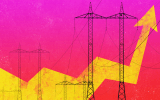
Households will be hit with another painful mortgage bill hike after the Reserve Bank opted to raise interest rates in November, ending a four-month reprieve amid renewed inflation fears.
Central bankers increased the cash rate target 0.25 percentage points to 4.35 per cent at a meeting on Tuesday – the highest level since 2011.
The move adds another $78 to monthly repayments on a typical $500,000, 25-year home loan, bringing total increases since May 2022 to more than $1200, according to RateCity figures.
RBA governor Michele Bullock said on Tuesday that inflation, though easing, is still too high and has proven “more persistent than expected a few months ago”.
“The latest reading on CPI inflation indicates that while goods price inflation has eased further, the prices of many services are continuing to rise briskly,” Bullock said.
“While the central forecast is for CPI inflation to continue to decline, progress looks to be slower than earlier expected.”
Economists expected the November hike after the September-quarter Consumer Price Index reading last week was much higher than forecast, threatening to derail the RBA’s desire to see underlying inflation ease from 5.2 per cent to the 2 to 3 per cent target by late 2025.
It is hoped that higher rates will help ease inflation faster by putting an even bigger brake on the economy, though households will bear the brunt again, amid record levels of mortgage stress.
Roy Morgan figures published last week found 1.57 million (or 30.3 per cent of mortgage holders) are now “at risk” of mortgage stress following more than a dozen rate hikes since May 2022.
Treasurer Jim Chalmers said the resumption of rate hikes would “make life harder for people who are already doing it tough”.
“The primary driver of inflation in the most recent data was petrol, but there are other inflationary pressures in our economy as well,” he said.
“What we’re doing as a government and what the Reserve Bank is doing as an independent board is all about trying to make sure that we can get on top of this inflation challenge in our economy.”
Bankwest Curtin Economics Centre senior research fellow Daniel Kiely said new home owners and renters will be hit particularly hard.
“Mortgage holders, particularly those new to the market, will feel the pain most and people trying to get on the property ladder will face reduced borrowing capacity,” he said.
“Renters too can expect to bear the brunt as investors look to pass on the costs of interest rate rises.”
Indeed APAC economist Callam Pickering said that the RBA hiked rates because they’re worried inflation isn’t falling fast enough.
“The recent data flow suggests that the risk of inflation remaining elevated for longer has increased,” he said.
“The RBA has long contended that further rate hikes may have been necessary to contain the current inflation outbreak.”
Bullock has also left the door open to another mortgage bill squeeze in December, suggesting on Tuesday that more action could be required.
“Whether further tightening of monetary policy is required to ensure that inflation returns to target in a reasonable time frame will depend upon the data and the evolving assessment of risks,” Bullock said.
CoreLogic research director Tim Lawless said the November rate hike would likely put a dent in the housing market recovery, but not stop it.
“While growth in housing values is likely to slow further, it’s hard to see prices going backwards over the near term,” he said.
“A shortage in housing supply, record-low vacancy rates and a lagged flow through to purchasing demand from record levels of overseas migration should help to keep some upwards pressure on home values.”












